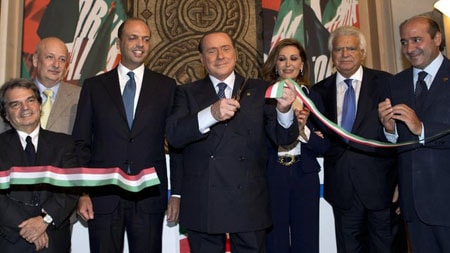Indirect takedown
Prime Minister Enrico Letta's ascension to the leadership of Italy in April 2013 was expected to break the long-standing political deadlock in this boot-shaped country. Less than half a year later, Enrico Letta's government collapsed in the face of fierce counterattacks from the Italian center-right, a partner in the ruling coalition. It is worth noting that the main cause of the collapse of the Italian government was attributed to the leader of the center-right People of Freedom (PDL) party, former Prime Minister Silvio Berlusconi.
 |
| PDL party leader Silvio Berlusconi (center), who is believed to be the cause of the collapse of Prime Minister Enrico Letta's government. Photo: Reuters |
Enrico Letta, Vice President of the Italian Democratic Party (PD), was appointed by re-elected President Giorgio Napolitano as the new Prime Minister of Italy in April 2013, replacing Pier Luigi Bersani, who had resigned shortly before. To form a government, Enrico Letta's center-left PD had to agree to a coalition with the center-right PDL of former Prime Minister Silvio Berlusconi, a traditional rival. In fact, to form a coalition government, Enrico Letta had to make many concessions and gave Silvio Berlusconi's party many ministerial positions in the new cabinet, while also promising to abolish the housing tax and refund the tax collected from the people in 2012.
However, after nearly half a year of "unpeaceful coexistence", on September 28, Deputy Prime Minister and Interior Minister Angelino Alfano announced that all five PDL ministers, including himself, had resigned, "under orders" from PDL leader Silvio Berlusconi. The announcement was made after Silvio Berlusconi "refused" to accept Prime Minister Enrico Letta's request for a vote of confidence in the current left-right coalition government. Former Prime Minister Silvio Berlusconi also blamed the current Italian government of Prime Minister Enrico Letta for raising the Value Added Tax (VAT), which is expected to take effect next week, and said that the VAT increase was a "serious violation of the agreements on the formation of the current left-right coalition government".
However, according to observers, the above blame is just an excuse. The main motive of Mr. Silvio Berlusconi and the PDL party is to put pressure on Prime Minister Enrico Letta before the Italian Senate on October 4 votes to expel their "boss" from the legislature, based on a 2012 anti-corruption law.
The issue of expulsion of former Prime Minister Silvio Berlusconi from the legislature arose after the Italian Supreme Court upheld his four-year prison sentence for financial fraud in the sale of television rights to the Mediaset company. Under Italian law, people sentenced to more than two years in prison are not allowed to participate in the election process. This means that Mr. Berlusconi will be stripped of his parliamentary status.
However, until now, the PDL senators who support Silvio Berlusconi are still trying to convince the parliament that the stripping of the billionaire's parliamentary status is illegal. Moreover, Silvio Berlusconi's lawyers have filed an appeal against the above ruling to the European Court of Human Rights, arguing that this ruling violates many provisions of the European Convention on Human Rights.
The center-right leader’s withdrawal of all his ministers from the ruling coalition has indirectly brought down Prime Minister Enrico Letta’s government and plunged Europe’s third-largest economy into crisis. The crisis could force early elections and severely hamper efforts to implement reforms needed to tackle Italy’s economic problems, including debt, recession and high youth unemployment. In a joint statement, the Italian Banking Association and the Italian Association of Insurance and Industry warned that a government crisis would be extremely damaging to Italy and risk sending the country back into a downward spiral, with major consequences for households and companies.
In such a context, analysts in Italy believe that if Mr. Enrico Letta can attract the support of a few dozen "rebellious" PDL senators or other opposition parties, he can form a new coalition government. Otherwise, President Giorgio Napolitano will either have to call a new general election or have to supervise the formation of a new government. According to the press of this country on September 29, President Giorgio Napolitano is leaning towards the possibility of finding a way to supervise the formation of a new coalition. President Giorgio Napolitano called for maintaining political continuity in Italy, emphasizing that Italy needs a parliament to discuss and work, not a parliament that breaks down from time to time.
According to QĐND - DT
